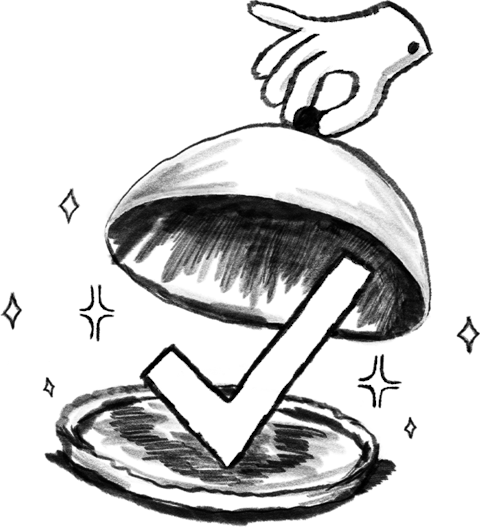Whether you started your freelancing business yesterday or years ago, you may experience these nagging thoughts: Do I really have what it takes? Have I earned my success? You’re scrolling through a barrage of self-congratulatory posts from colleagues and friends announcing their promotions on LinkedIn or showing off their latest awards on Instagram. They seem so accomplished, and you don’t doubt they’ve earned their successes. But when it comes to your own accomplishments, you’re not so sure.
Betting on yourself as a freelancer
Imposter syndrome is real. Here’s how to tackle it.


This lack of confidence is so widespread, it even has a name: Imposter syndrome. Many working people can experience it in different ways and to varying degrees, from aspiring freelancers to C-suite executives. But Valerie Young, co-founder of the Imposter Syndrome Institute, has broken it down into these 5 archetypes:
- The perfectionist, for whom a single error amounts to a poor job
- The expert, for whom even a tiny knowledge gap stirs up feelings of inadequacy
- The soloist, who thinks needing help is a sign of weakness
- The superhuman, who feels they need to excel in every role
- The natural genius, who is discouraged when they can’t immediately master a subject
If you feel inadequate or anxious about being exposed as a “fraud,” you may be experiencing imposter syndrome. It’s a feeling that can be so pervasive and debilitating that you might pass on jobs you’re qualified for, credit others for your work, or accept lower rates than you deserve.
In our 2022 Mailchimp & Co Benchmark Report, we surveyed over 2,000 agencies and freelancers and found that freelancers who reported billing more than $50K said they felt more confident and less stressed. It’s possible that building confidence—a crucial step toward tackling imposter syndrome—isn’t just a way to reduce stress and self-doubt, but is also integral to building your business.
Because there’s no singular experience of imposter syndrome, there’s no singular approach to keeping it in check, but there are solutions out there. You can seek coaching or counseling, change your environment or habits, read up on topics you’re unsure about, or increase your confidence and credentials with new training.
Ultimately, the key to tackling imposter syndrome is remembering that, like nearly everything, managing it is possible. Here are some tips to help conquer it—or at least take it down a notch.
Face it head on
The first step to solving any problem starts with identifying and recognizing it. Ask yourself: Does my behavior fit the pattern of any of the imposter syndrome archetypes listed above? Do I feel like I’m on the verge of being “found out,” despite my experience and rock-solid qualifications? Be candid with yourself, but as you do that, be kind to yourself, too. You’re definitely not alone.

Be your own cheerleader
Literally. Tell yourself—out loud—that you’ve got all the skills and experience you need to succeed. There’s a catch, though: Tell yourself in the third person. In a University of Michigan-led study, participants were asked to give a speech with only 5 minutes of preparation. While preparing, some were asked to address themselves using “I,” and others as “You,” or by their given name.
Those in the first group—the ones using the first person—were more likely to talk themselves down. (“How am I going to come up with a speech in 5 minutes?”) By contrast, people referring to themselves as “You,” or by their own names, were far more likely to support themselves and affirm their own self-worth. (“Okay, Sofia, the first thing you need to do is come up with a snappy intro.”) If you find you’re being too hard on yourself, try looking in the mirror to see if you can be kinder to that competent person looking back at you.
Celebrate your wins
You haven’t gotten as far as you have without doing a few things right. You’ve persuaded prospective clients to take you on board, negotiated contracts, and been rewarded with great results and proud moments after a successful campaign. You should congratulate yourself frequently. Your hard work makes things happen, and while that shouldn’t stop you from giving others their due, recognizing your own efforts is important, too.

Talk it out
You don’t have to suffer through imposter syndrome alone—and you shouldn’t. Talking to a therapist, counselor, or coach could help you break through. And since up to 4 out every 5 people may have some familiarity with imposter syndrome, you’re likely to find some common ground amongst your peers, too.
Lean into it
At its most extreme, imposter syndrome can be all-consuming—and when it is, you might need outside help to tackle it. But when it’s milder, it can actually catalyze growth. Is there something you could become better at? Consider taking a course, reading a relevant book by an expert, or talking to peers who have more confidence in that area. Getting certified is another way to show the world—and yourself—that you’ve got the credentials to deliver the goods. If you haven’t done so already, sign up for Mailchimp & Co and you’ll gain access to Mailchimp Academy. Once enrolled, you can earn your Foundations certification. Then, earn more badges, by getting certified in Email Marketing and Email Automations to continue your growth.

Suffer not
As we’ve seen, while it may be difficult to dispel imposter syndrome entirely, building your confidence can derail those unhelpful thoughts that can lead to self-doubt. Remember that it’s a common issue, so you should never feel like you have to suffer in silence—or at all. You’ve got this.
Partner up with Mailchimp & Co
Our community of like-minded and supportive marketers is committed to helping freelancers and agencies like you do your best work. Join us today and enjoy free tools and resources that can help you boost your confidence—and your business.